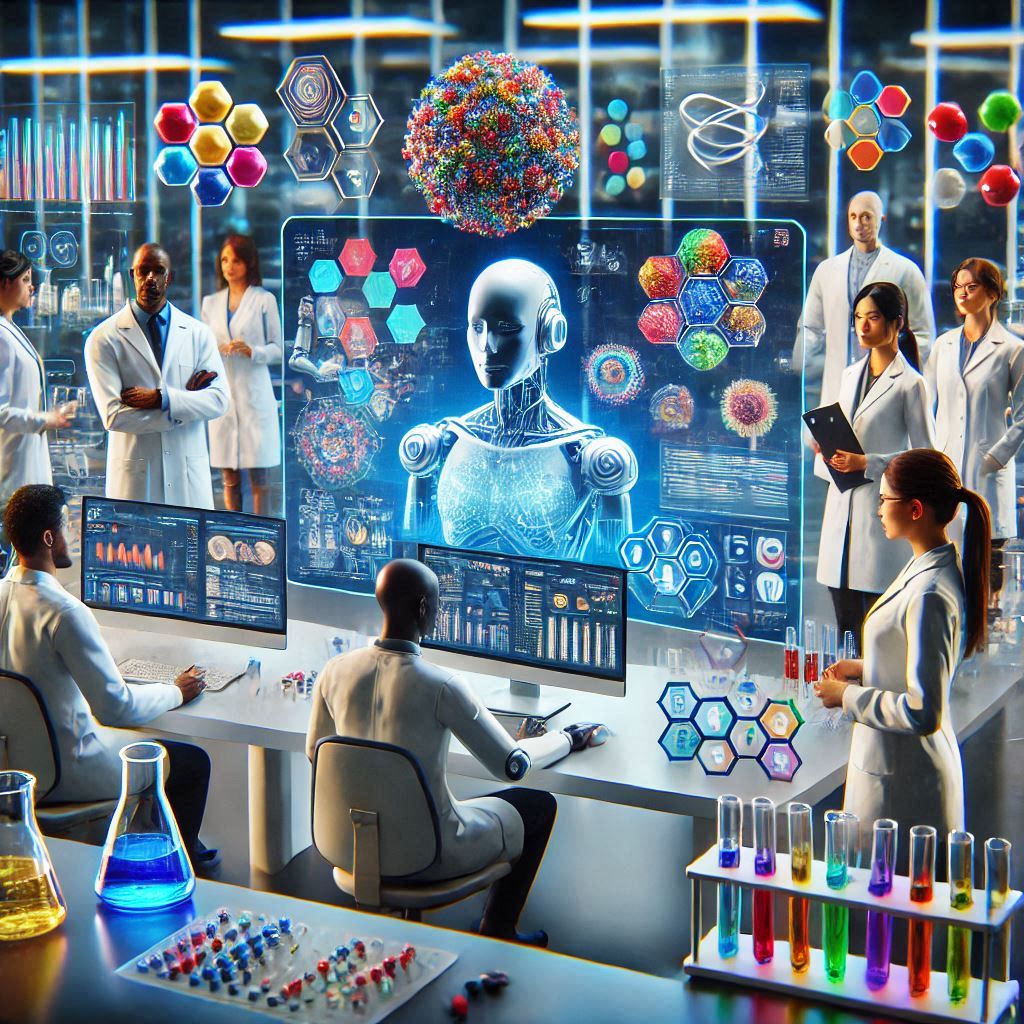The Role of AI in Drug
The pharmaceutical industry is undergoing a transformative shift, driven by the integration of artificial intelligence (AI) into drug discovery and research processes. AI’s ability to analyze vast amounts of data, identify patterns, and predict outcomes is revolutionizing the way new drugs are discovered, developed, and brought to market. This blog explores the role of AI in drug discovery and pharmaceutical research, highlighting its benefits, applications, and future potential.

The Challenges in Traditional Drug Discovery
Traditional drug discovery is a complex, time-consuming, and costly process. It typically involves several stages, including target identification, lead compound discovery, preclinical testing, and clinical trials. Each stage presents its own set of challenges:
- High Costs: Developing a new drug can cost billions of dollars, with a significant portion of the budget allocated to research and development.
- Time-Consuming: The entire process from discovery to market approval can take over a decade.
- High Failure Rates: Many potential drugs fail during clinical trials due to inefficacy or safety concerns, leading to substantial financial losses.
How AI is Transforming Drug Discovery
AI is addressing these challenges by enhancing efficiency, reducing costs, and increasing the success rates of drug discovery. Here are some key ways AI is transforming the pharmaceutical industry:
- Target Identification and Validation:
- AI algorithms can analyze biological data to identify potential drug targets, such as proteins or genes associated with a disease. Machine learning models can predict the relevance and druggability of these targets, streamlining the initial stages of drug discovery.
- Lead Compound Discovery:
- AI-powered platforms can screen vast libraries of chemical compounds to identify potential lead compounds that interact with the target. These platforms use techniques like deep learning and molecular modeling to predict the binding affinity and activity of compounds, accelerating the hit-to-lead process.
- Drug Repurposing:
- AI can identify existing drugs that may be effective for new therapeutic indications. By analyzing data from clinical trials, electronic health records, and scientific literature, AI can uncover new uses for approved drugs, reducing development time and costs.
- Predictive Modeling for Drug Safety and Efficacy:
- AI models can predict the safety and efficacy of drug candidates by analyzing preclinical and clinical data. These models help identify potential adverse effects and optimize dosing regimens, improving the chances of success in clinical trials.
- Optimization of Clinical Trials:
- AI can optimize the design and execution of clinical trials by identifying suitable patient populations, predicting patient responses, and monitoring trial progress in real-time. This leads to more efficient and cost-effective trials with higher success rates.
Applications of AI in Pharmaceutical Research
AI’s impact extends beyond drug discovery to various aspects of pharmaceutical research:
- Precision Medicine:
- AI enables the development of personalized treatment plans based on an individual’s genetic makeup, lifestyle, and medical history. By analyzing patient data, AI can identify biomarkers and predict responses to specific treatments, leading to more effective and tailored therapies. (The Role of AI in Drug)
- Biomarker Discovery:
- AI algorithms can analyze omics data (genomics, proteomics, metabolomics) to identify biomarkers associated with disease progression and treatment response. These biomarkers can be used for early diagnosis, patient stratification, and monitoring treatment efficacy. (The Role of AI in Drug)
- Supply Chain Optimization:
- AI can optimize the pharmaceutical supply chain by predicting demand, managing inventory, and identifying potential disruptions. This ensures timely delivery of drugs and reduces waste, improving overall efficiency. (The Role of AI in Drug)
- Regulatory Compliance:
- AI can assist in ensuring regulatory compliance by analyzing data from clinical trials and manufacturing processes. Automated systems can detect anomalies, generate reports, and ensure adherence to regulatory standards, reducing the risk of non-compliance.
Benefits of AI in Drug Discovery and Research
The integration of AI into drug discovery and pharmaceutical research offers numerous benefits: (The Role of AI in Drug)
- Increased Efficiency:
- AI accelerates various stages of drug discovery, from target identification to clinical trials, reducing the time required to bring new drugs to market.
- Cost Reduction:
- By streamlining processes and improving success rates, AI reduces the overall cost of drug development, making it more economically viable. (The Role of AI in Drug)
- Improved Success Rates:
- AI’s predictive capabilities enhance the accuracy of target identification, lead compound discovery, and clinical trial design, increasing the likelihood of successful outcomes.
- Enhanced Precision:
- AI enables the development of precision medicine, offering personalized treatments that are more effective and have fewer side effects.
- Data-Driven Insights:
- AI leverages vast amounts of data to generate insights that drive innovation and improve decision-making in pharmaceutical research. (The Role of AI in Drug)
Future Potential of AI in Drug Discovery
The future of AI in drug discovery and pharmaceutical research is promising. As AI technologies continue to advance, their applications will expand, leading to even greater efficiencies and breakthroughs. Some potential future developments include: (The Role of AI in Drug)
- Integration with Quantum Computing:
- The combination of AI and quantum computing could revolutionize drug discovery by solving complex molecular problems that are currently intractable.
- AI-Driven Drug Design:
- AI could design novel drug molecules from scratch, optimizing their properties for specific targets and therapeutic indications.
- Real-Time Monitoring and Adaptation:
- AI could enable real-time monitoring of patient responses during clinical trials, allowing for adaptive trial designs and personalized treatment adjustments.
- Global Collaboration:
- AI platforms could facilitate global collaboration among researchers, sharing data and insights to accelerate drug discovery and development.

Conclusion
AI is playing a transformative role in drug discovery and pharmaceutical research, offering solutions to longstanding challenges and driving innovation. By enhancing efficiency, reducing costs, and improving success rates, AI is paving the way for a new era of drug development. As technology continues to evolve, the integration of AI into the pharmaceutical industry will undoubtedly lead to groundbreaking advancements and improved healthcare outcomes for patients worldwide.
Social Media handles (Facebook, Linkedin, Twitter
Go to our Website for News and Articles: https://informtoyou.com/


